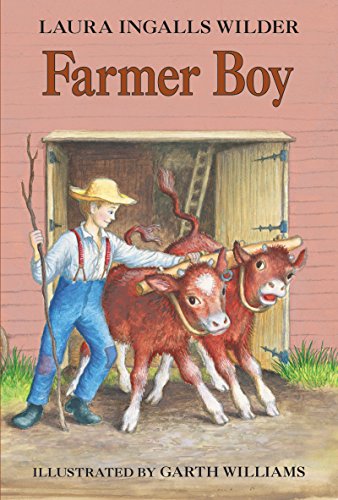
Little House in the Big Woods was a book that hooked me from start to finish. I read it all in a very short space of time and, of course, it left me eager to read the rest of the Little House series. Farmer Boy is the second book in the series, but it’s a very different experience to the first.
While Little House in the Big Woods was about Laura’s childhood, Farmer Boy was instead about the childhood of her husband, Almanzo. Maybe it’s because these weren’t experiences that she had lived herself, but this book seems to lack the magical sentimental feeling that the first book was able to convey. The first book describes a really beautiful life, whereas the life Almanzo leads feels pretty bleak.
For example, Almanzo does gruelling amounts of hard physical labour around the farm he lives on (even as a child) and this is described in a lot of detail. No doubt, this is a highly accurate look at the difficult lives people led back then and I wouldn’t want to fault it for that, but after the first book, I went in expecting something very different.
The early chapters describe how a teacher was recently murdered by a gang of violent teenagers who didn’t like being told off at school and the fact that teenagers may do this to their teachers is just treated as a fact of life. Nobody even thinks about doing anything about it. The world in which Almanzo grew up was a particularly nasty one.
Nonetheless, there were several bits I really liked. At one point, there’s a really hard winter, with heavy snowfall and it describes everything that they had to do to ensure their lives weren’t too seriously disrupted. It was all so vivid and left such a strong impression that you can almost imagine what it would have been like to live through it.
Overall though, I had one big problem with this book: throughout it, there was a pervading “work is life” message. Yes, it may be true that people living in that time will have had to dedicate so much of their time to working just to survive and that the options for other things to do in very rural areas were limited, but I feel like that can be highlighted as a “look how hard their lives were” kind of way, rather than “it’s right to spend most of your existence working” because it made it all seem even more depressing.
The weird obsession with work seems to come most strongly from Almanzo’s father, who I thought seemed like quite an unlikeable person. Though he wasn’t all bad, he seems to spare no love or affection for his wife and children and instead seems to be more interested in just making sure they learn the hard lessons of life. He’s such a cold man and I honestly just felt sorry for Almanzo having to live with him most of the time.
This book is definitely a curiosity and I am glad I read it, but I enjoyed the experience much less than I did the first book. The first book was a nostalgic account of someone’s childhood in a long gone age, while this book is about the misery of poverty in 1860s America. Fans who loved the first book should brace themselves for quite a change. Also, as it has no real connection to the first one, feel free to read this one if you haven’t read the first yet.
Rating: 6.4/10
